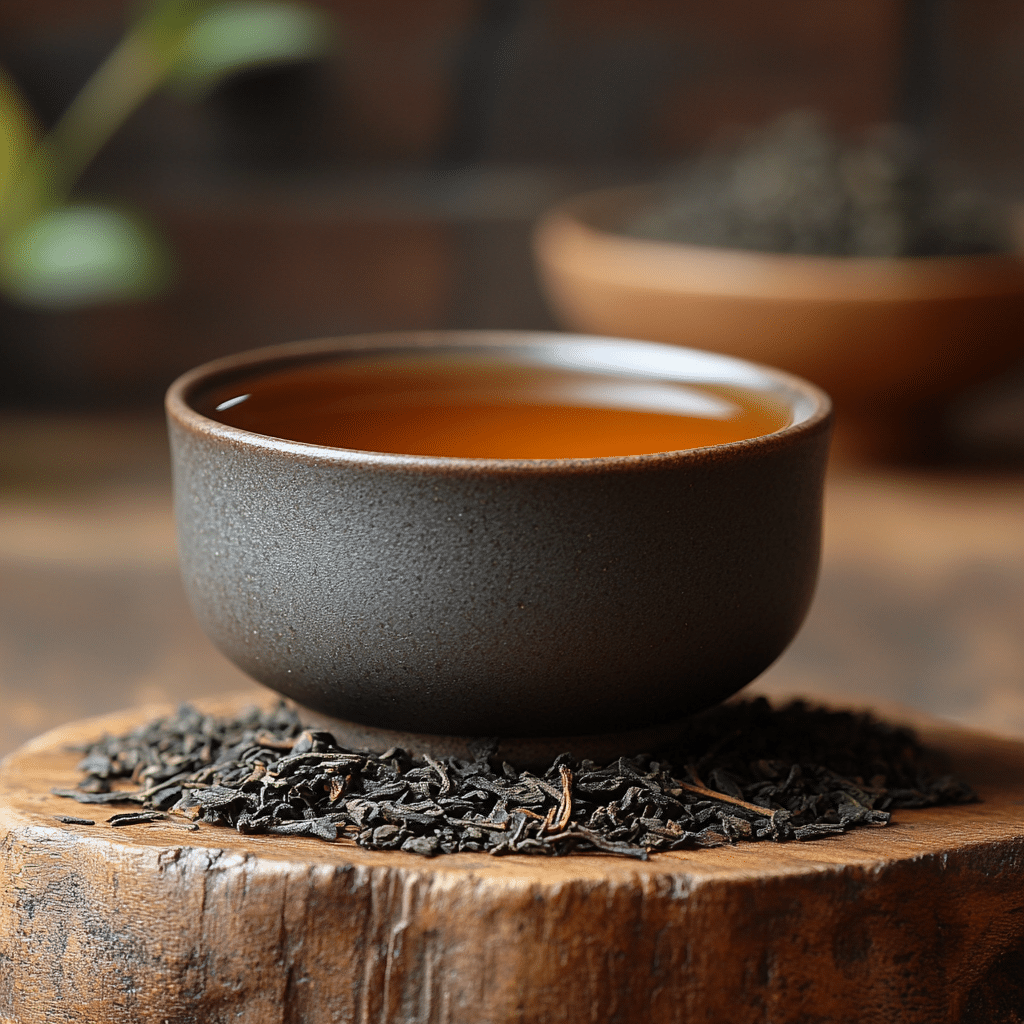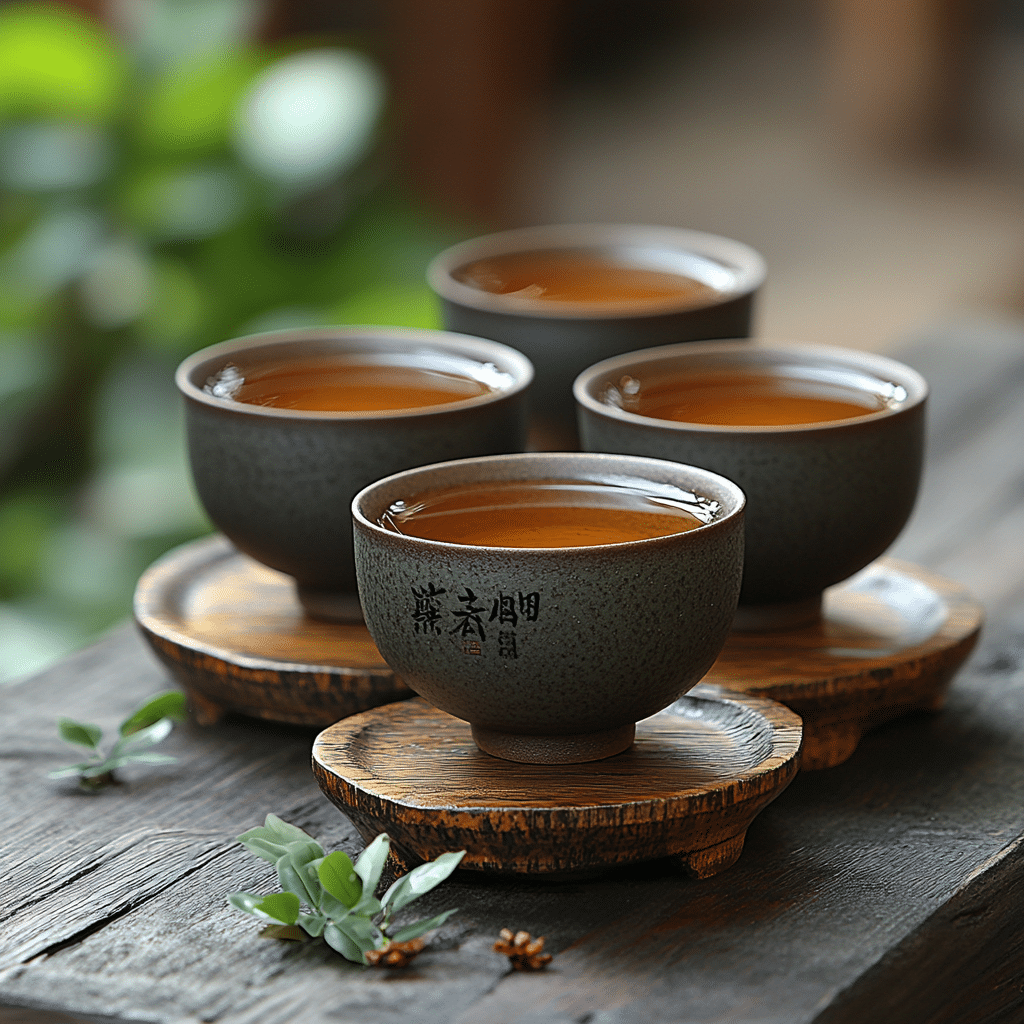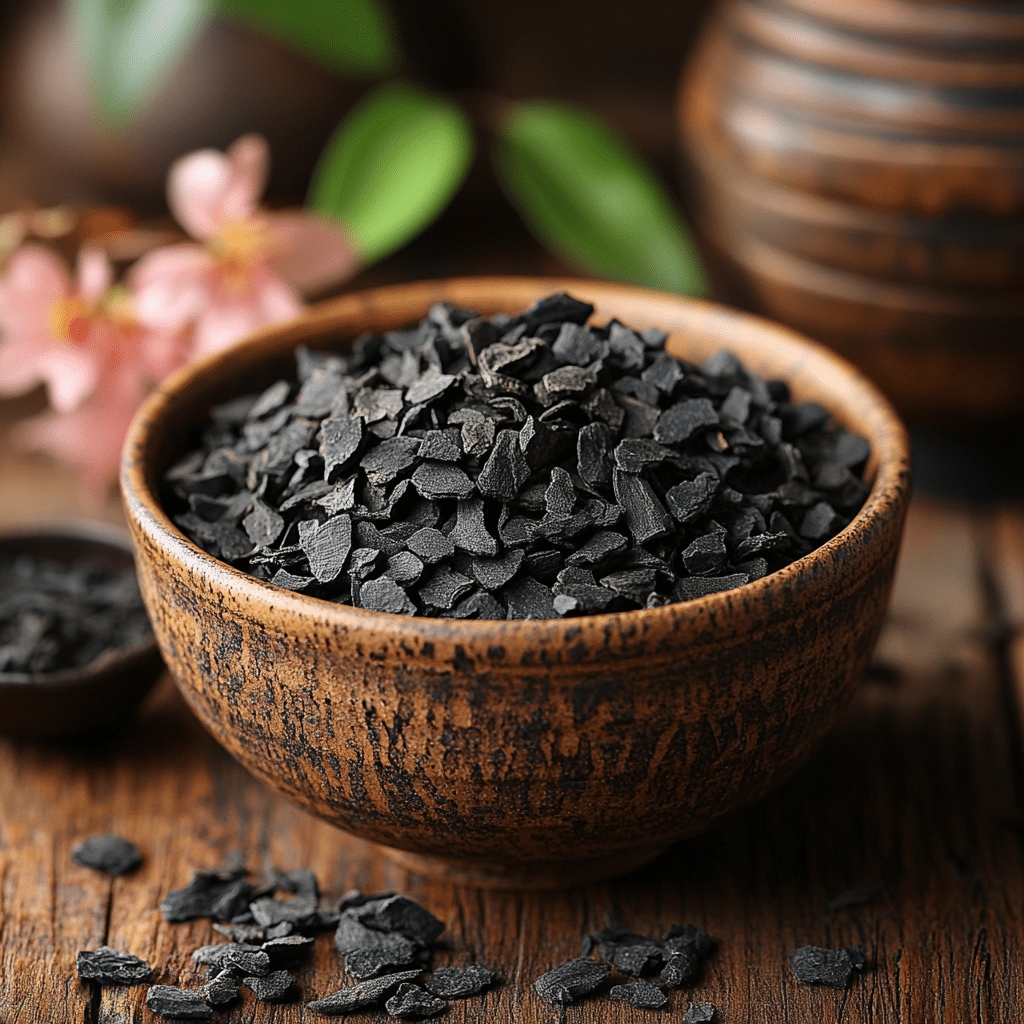The Ancient Origins of Da Hong Pao: A Historical Treasure
Da Hong Pao, the “King of Tea,” boasts a storied past that reaches all the way back to the Ming Dynasty. Originating from the steep cliffs of the Wuyi Mountains in Fujian Province, China, this oolong tea has captivated many with its beauty and mystery. According to legend, an emperor’s mother was gravely ill, and none of the traditional remedies seemed to help. Miraculously, she was cured by a tea brewed from four special bushes growing in these mountains. To express his gratitude, the emperor draped these bushes in large red robes, hence the name Da Hong Pao, meaning “Big Red Robe.”
Throughout history, Da Hong Pao has attracted attention not just for its tantalizing taste but also for its legendary healing properties. Stories like the emperor’s mother only enhance its mythic status and underline why it was, and still is, considered a precious asset. Early records from the Ming Dynasty, along with various local accounts, confirm its longstanding reputation. It’s no wonder this tea has been treasured for centuries and continues to be a cultural and historical artifact.
Unique Characteristics That Make Da Hong Pao a Standout
Da Hong Pao isn’t just your run-of-the-mill tea. Its unique characteristics set it apart from other oolongs. The tea offers a rich, harmonious blend of robust flavors and intricate aromas that provoke the senses. One sip delivers a full-bodied experience with smooth, earthy notes complemented by undertones of floral and fruity fragrances. Tea aficionados often note a lingering sweet aftertaste, particularly reminiscent of ripe stonefruit.
The Wuyi Mountains’ unique mineral composition lends Da Hong Pao its unmatched qualities. These mineral-rich soils fuse with traditional roasting techniques, producing a tea with unparalleled depth. Unlike Tieguanyin, which is lighter and more floral, Da Hong Pao’s roasted and multidimensional profile stands out. A good Wuyi oolong like Da Hong Pao should endure several steepings without losing its essence, offering a multiple-layered drinking experience that’s hard to beat.

| Aspect | Details |
| Type | Oolong Tea |
| Origin | Wuyi Mountains, Fujian Province, China |
| Meaning | “Big Red Robe” |
| Historical Significance | Legend states an emperor’s mother was cured by tea from special bushes; as thanks, the emperor gifted red robes to protect the plants. |
| Mother Trees | Only 6 remaining on the cliffs of Jiulongyu (Wuyi Mountains) |
| Flavor Profile | Rich, satisfying body with a lingering sweet aftertaste and notes of ripe stonefruit; stands up to many steeps without sourness or excessive roast taste. |
| Comparison | Unlike Tieguanyin, which has a light floral note and crisp taste, Da Hong Pao is roasted and complex. |
| Health Benefits | Both Da Hong Pao and Tieguanyin offer numerous health benefits, providing a multilayered drinking experience. |
| Price Range | Extremely high due to its scarcity and superior quality. Some of the rare mother tree leaves can sell for more than gold by weight. |
| Esteemed Title | Known as the “King of Tea” |
| Cultural Importance | Highly beloved, sought after, and often given as a gift. Steeped in centuries-old legend. |
| Steeping Recommendations | Should be brewed multiple times; each steep reveals different layers of flavor. |
| Availability | Rare; prized by connoisseurs and often bought by collectors. |
The Rarity and Value of Da Hong Pao: An In-Depth Analysis
Rarity drives the astronomical value of Da Hong Pao. There are only six original mother trees left on the steep cliffs of Jiulongyu in the Wuyi Mountains, making this tea an extraordinary treasure. Because these mother bushes are centuries old and rarely harvested, the genuine leaves from these plants are worth their weight in gold—literally. In 2023, 20 grams of these exclusive leaves fetched a staggering $1.2 million at auction.
This scarcity has led to a thriving market for high-quality replicas. While these replicas offer a similar taste, they can never capture the full mystique and flavor profile that the genuine article provides. Discerning tea connoisseurs go to great lengths to ensure they’re sipping on the real deal, often sourcing directly from Wuyi or opting for teas certified by reputable houses.
The Cultural Significance of Da Hong Pao in Modern China
In today’s China, Da Hong Pao stands as more than just a luxurious beverage; it’s a cultural icon. Given as a premium gift during major events like Chinese New Year and business meetings, it symbolizes sophistication and high social status. Its pivotal role in Chinese tea ceremonies further accentuates its cultural importance, making it a treasure that’s both admired and revered.
The tea also graces the tables of the wealthy and is frequently gifted to foreign dignitaries. Just as with Paintings Of Sunflowers, presenting Da Hong Pao can be seen as a gesture of significant respect and admiration.

Profiles of Renowned Tea Masters and Producers of Da Hong Pao
No discussion of Da Hong Pao would be complete without mentioning the dedicated tea masters and producers who devote their lives to perfecting this elixir. Renowned figures like Master Huang Ruicheng have spent decades mastering the intricate art of Da Hong Pao cultivation and production. His expertise and dedication have garnered global recognition, cementing his status as a true artisan.
Leading companies, such as the Wuyishan Tea Company and Song Tea, merge centuries-old practices with innovative techniques. By balancing tradition with modern advancements, they produce Da Hong Pao that meets rigorous quality standards while preserving the tea’s quintessential character. Their determination ensures that each batch of Da Hong Pao remains a testament to its illustrious heritage.
The Quest for Authentic Da Hong Pao: How to Identify Genuine Leaves
Given the influx of imitations, recognizing genuine Da Hong Pao is crucial for any tea enthusiast. Real Da Hong Pao leaves are rich, dark-green to brownish and often twisted into thin strips. When brewed, the tea should produce a deep amber color, exuding a floral aroma and culminating in a lingering sweet aftertaste.
Certifications from well-regarded tea houses offer additional assurances of authenticity. Furthermore, sourcing directly from reputed producers in the Wuyi Mountains can minimize the risk of purchasing counterfeits. Remember, authentic Da Hong Pao is a rare and delightful treasure, so keep an eye out for these hallmark traits to enjoy the real deal.
Health Benefits of Da Hong Pao: More Than Just a Luxurious Beverage
Beyond its exceptional taste and storied history, Da Hong Pao offers a host of health benefits. The tea is packed with antioxidants, such as polyphenols, known to reduce oxidative stress and inflammation. Regular consumption can support cardiovascular health by lowering cholesterol levels, as highlighted in studies published in the Journal of Agricultural and Food Chemistry.
Moreover, Da Hong Pao can enhance mental clarity and focus. The tea’s balance of caffeine and calming compounds provides a gentle, sustained energy boost without the jitteriness associated with coffee. Its health benefits make it more than just an indulgence; it’s a functional beverage that contributes to overall well-being.
Exploring Modern Twists on Traditional Da Hong Pao Preparations
While traditional methods of brewing Da Hong Pao remain popular, modern innovations have breathed new life into this ancient tea. Artistic tea blends and contemporary preparations are gaining traction, especially among younger tea drinkers. Recognized producers like Liu Bao Tea have even created Da Hong Pao-infused chocolates, combining traditional tea flavors with modern culinary creativity.
Tea Master Zhao’s innovative cold brews are another hit, offering a refreshing twist that appeals to a more diverse audience. These contemporary variations ensure that Da Hong Pao’s rich heritage is preserved while also making it accessible and exciting for new generations. And just like Daisy Jones And The Six book, these modern takes on Da Hong Pao have a timeless appeal that resonates across age groups.
The Global Market for Da Hong Pao: Export Trends and Predictions
Da Hong Pao’s allure isn’t confined to China. The global market for this premium tea has grown substantially, particularly in countries with thriving tea cultures like the United States and Japan. Export data from the China Tea Marketing Association showed a 15% increase in Da Hong Pao exports in 2022. This trend hints at a growing appreciation for luxury teas worldwide.
Market analysts predict this surge in global demand will continue, driven by a rise in affluent consumers eager for premium and exclusive experiences. Whether it’s for personal enjoyment or as a prestigious gift, the growing market for Da Hong Pao underscores its enduring appeal across cultures.
Final Thoughts: The Lasting Impact of Da Hong Pao on the Tea World
As we look toward the future, Da Hong Pao remains an unparalleled symbol of tea mastery and cultural significance. With its extraordinary history, unique flavor profile, and impressive health benefits, it continues to captivate and satisfy discerning palates around the globe. For tea enthusiasts seeking more than just a drink, Da Hong Pao offers an experience rich in heritage and excellence.
From its ancient origins in the Wuyi Mountains to its modern-day prestige, Da Hong Pao endures as the epitome of fine tea. It’s a treasure that transcends generations, promising to enchant and inspire for many years to come. For those compelled by tradition and excellence, Da Hong Pao is not just a beverage, but a timeless journey into the heart of tea culture.
Da Hong Pao: The King of Tea and Its Rare Value
Historical Ties and Mystical Legends
Da Hong Pao, revered as the “King of Tea,” boasts a rich tapestry of history and lore. One intriguing legend claims that the tea was used to heal a Ming Dynasty emperor’s ailing mother. In gratitude, the emperor ordered his red robes draped over the tea bushes, supposedly imparting the name Da Hong Pao, or “Big Red Robe.” This tea’s legacy is nothing short of royal! Fun fact: just how rare is this tea? The remaining original bushes growing in the Wuyi Mountains are valued at astronomical prices—worth more than many high-end properties.
Economic Value and Cultivation
If you thought the price of a New York City penthouse was steep, check this out: Da Hong Pao is priced sometimes higher than gold by weight. A single gram could set you back hundreds of dollars, making it more of a treasure than just a simple beverage. That’s some serious tea! Its cultivation is as meticulous as it sounds. The climate and the unique terroir of the Wuyi Mountains contribute significantly to its rare taste. Interestingly, the tea seeds once even made their way to Turkey’s Dalaman region, causing quite a stir due to their cultural significance.
Unique Characteristics and Modern Appreciation
Da Hong Pao doesn’t just bring history and value—the taste is a transcendent experience. With a flavor profile that combines a rich, full-bodied taste with delicate floral notes, it’s no wonder that connoisseurs treat every sip like gold. This tea has made its way into high society and luxurious events, just as prominent as an evening match featuring Atlético Madrid Vs Feyenoord Lineups for football devotees. Such events bring people together over a shared passion, whether it’s tea or sports.
Fun Oddities and Beyond
Diving deeper into trivia, did you know one of the original Da Hong Pao bushes produced a tea that fetched over $30,000 for just 20 grams? It appears that’s not just a little cha-ching, huh? Such stories turn the tea into not just a drink but a status symbol. This tea’s prominence even extends to places as diverse as the quaint village of Dalmally, where tea enthusiasts gather to share and celebrate their love. Made curious yet? How about calculating how many cups of Da Hong Pao you could buy if you’ve paid off your mortgage using an online mortgage rate calculator?
To sum it all up, Da Hong Pao continues to captivate with its storied past, economic clout, and an unmistakable taste that dances on the palate. From the bustling teahouses of Ann Arbor to the serene shores of Dalaman, the world over finds something truly unique in this grand tea. Ready for another cuppa?

Why is Da Hong Pao so expensive?
Da Hong Pao is on the pricier side due to its rarity and exceptional quality. There are only six mother trees left on the stiff cliffs of Jiulongyu in the Wuyi Mountains, making this tea a rare treasure. Its superior taste and the legend surrounding it add to its high value.
What is the meaning of Da Hong Pao?
Da Hong Pao translates to “Big Red Robe.” This name is rooted in a Chinese legend where an emperor, grateful for a miraculous cure his mother received from the tea, gifted red robes to the special tea bushes in the Wuyi Mountains.
What does Da Hong Pao taste like?
Expect a rich and satisfying body with Da Hong Pao. This oolong tea offers a sweet aftertaste and notes of ripe stonefruit. It’s well-balanced, with no harsh sourness or overpowering roast, making for a delightful, multilayered drinking experience.
What is the difference between Tieguanyin and Da Hong Pao?
Tieguanyin and Da Hong Pao differ significantly in taste and aroma. Tieguanyin has a light floral note and a crisp taste, while Da Hong Pao is roasted and complex with a rich, satisfying body and sweet aftertaste. Both teas have their unique appeal.
What’s the most expensive tea in the world?
The most expensive tea in the world is Da Hong Pao. Its rarity and excellent quality make it a highly sought-after and valuable tea, with some of the original tea trees being centuries old.
Which is the best tea in world?
Opinions vary on the best tea in the world, but many consider Da Hong Pao as a top contender due to its rich history, exceptional taste, and the legendary status of the remaining mother trees.
What is the most premium Chinese tea?
In the realm of premium Chinese teas, Da Hong Pao takes the top spot. With only six mother trees left and a long-standing reputation for its remarkable quality, it is cherished as the king of teas.
How much caffeine is in Da Hong Pao?
Da Hong Pao tea contains a moderate amount of caffeine, typical for most oolong teas. It’s enough to give you a bit of a pick-me-up without the jitters associated with stronger caffeinated beverages like coffee.
Which tea was given to Nixon in China?
During Richard Nixon’s visit to China, he was gifted a special Da Hong Pao tea. This was part of the diplomatic exchanges between the United States and China, symbolizing high respect and friendship.
What is the rarest type of tea?
Da Hong Pao is considered one of the rarest types of tea due to its limited production from only six mother trees in the Wuyi Mountains. This rarity significantly boosts its value and desirability.
How long does it take to steep Da Hong Pao?
For Da Hong Pao, steeping typically takes about 30 seconds to 1 minute for the first infusion. Each subsequent steep can last a bit longer, allowing the rich flavors to develop fully over multiple infusions.
Which country produces the best tea in the world?
China is often praised for producing some of the best tea globally, thanks to its diverse climate, long history of tea cultivation, and vast variety of high-quality teas like Da Hong Pao and Tieguanyin.
Is Da Hong Pao fermented?
Da Hong Pao is partially fermented, making it an oolong tea. This fermentation process gives it a distinctive flavor profile that’s a bit more complex than green tea but lighter than black tea.
What does Tieguanyin smell like?
Tieguanyin gives off a light floral aroma, often compared to orchids. This captivating fragrance enhances the overall tea-drinking experience, making it both refreshing and soothing.
What is the English name for Tie Guan Yin tea?
The English name for Tieguanyin tea is Iron Goddess of Mercy. This oolong tea is known for its floral notes and crisp, clean taste, offering a refreshing experience with every sip.
Why is Hong Kong most expensive?
Hong Kong is known for its high cost of living, partly due to limited space leading to expensive real estate. Its status as a global financial hub also attracts wealth, driving up prices in various sectors including dining and luxury goods.
What is the most premium Chinese tea?
When it comes to premium Chinese teas, Da Hong Pao holds the title. Its status as a rare, high-quality oolong with only six original mother trees left earns it this prestigious recognition.
What is the most expensive cup of tea?
The most expensive cup of tea is made from Da Hong Pao. With its legendary history and the rarity of mother trees, a single serving of this tea can fetch an astronomical price, making it a true luxury.
How much is the Hong Pao tea?
Da Hong Pao tea can cost thousands of dollars per gram, especially from the original mother trees. This high price reflects its rarity, superior quality, and the centuries-old legend that surrounds it.



